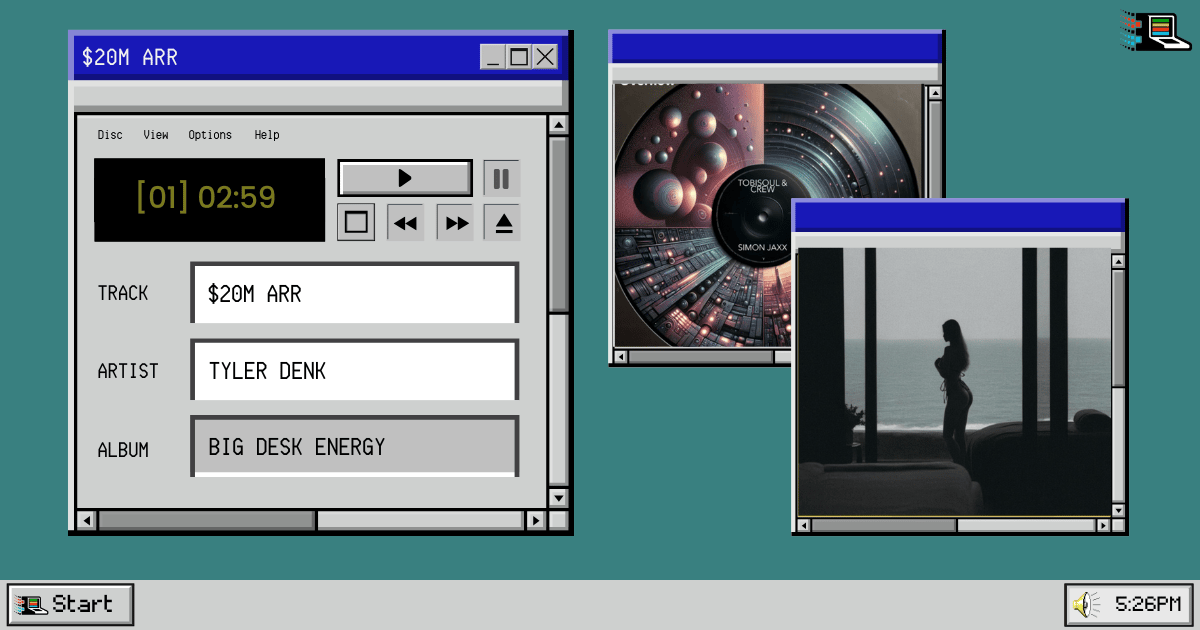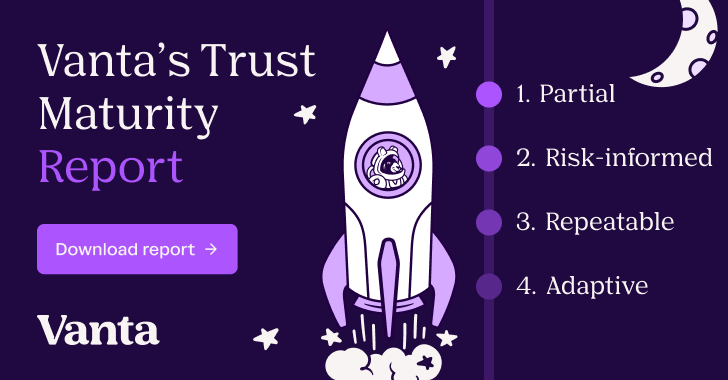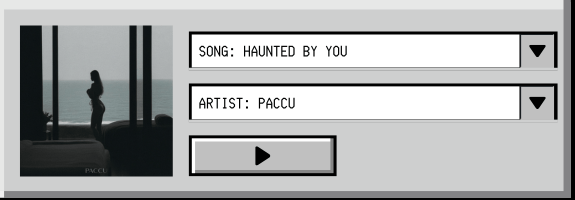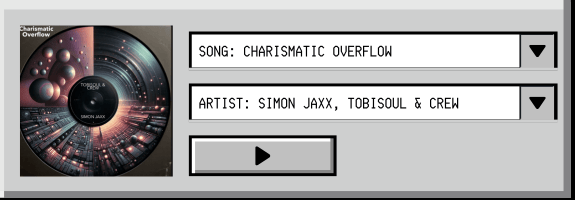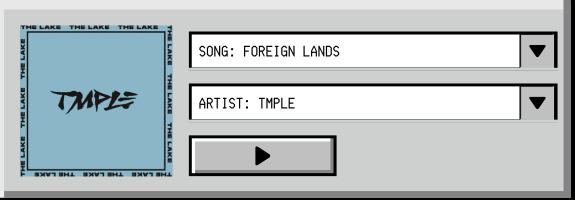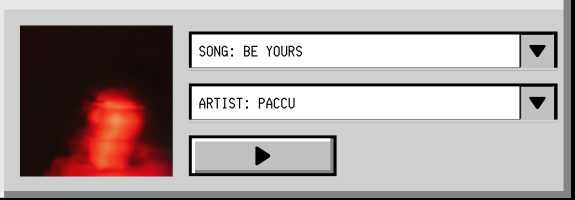The best founders learn from the mistakes of other founders… so let me help you: don’t ignore the importance of security.
You might think that I’m going to recommend a demo. Think again — simply download the free Vanta Trust Maturity Report and send it to your CTO.
Vanta’s Trust Maturity Report helps you benchmark your security program against your peers, and consists of customer insights and anonymized data from 11,000+ Vanta customers.

Last week, 3.5 years after launching the company, we surpassed $20M ARR. That doesn’t include the Ad Network or Boosts, which accounts for another ~$10M of revenue.
If you were curious what that looks like as a tweet:
I’ve never been so bullish about the future of the business. The beehiiv Ad Network, while a smaller piece of the pie, increased revenue 64% MoM in May 🤯.
Translation: we’re just getting warmed up.
I’ve never written one of those cringe posts on X when you turn your birthday into a listicle of lessons for your younger self… but then again, $20M ARR is much cooler than your birthday.
So here’s a list of 20 things that are top of mind for me as I reflect on this milestone. Some are lessons, some are insights, and some are just lost thoughts that you hopefully find useful…
It doesn’t get any easier.
I have just as many (if not more) problems today than I did back when we were just getting started. I’d always tell myself the story that one day things would feel calmer, more things would be delegated, and the stress would feel just a bit less overwhelming.
And maybe that day will eventually come, but it hasn’t yet. Different levels, different devils.
The goalposts are always moving.
If you would have told 27 year old Tyler that his little startup would have $20M ARR in the next 4 years, he would have shit his pants on the spot.
But 31 year old Tyler did not shit his pants. In fact, it was as uneventful as refreshing Stripe, capturing a screenshot, posting it, then getting right back to writing the PRD I was working on. What previously felt insurmountable has been normalized as just another stepping stone.
(Most) advisors are totally useless.
Advisors give startups some legitimacy in the early days to signal confidence to potential investors and users. Which is fine, just call it what it is.
We have a handful of advisors: some check in from time to time, others I haven’t spoken to in years.
I never expected anything different, so I don’t have any hard feelings. I would just caution other founders who think having the right advisor will change their business.
No one cares who your investors are.
I know way too many founders who get caught up trying to chase Tier 1 investors. Customers don’t care who’s on your cap table, and if you feel the need to lead with that, you’re probably overcompensating for something else.
My advice: take the easiest money you can get and get back to building. If you build a good business, the Tier 1s will come to you.
Our seed round was led by a (great) fund that most people haven’t heard of. Our seed extension was co-led by two (also great but lesser known) funds based in the UK.
Some gigabrain will try to convince you that’s a “negative signal.” Well, that didn’t stop Lightspeed from leading our Series A, or NEA from leading our Series B.
Remote work is a super power.
There’s no denying that working in person with others is amazing, but the benefits of remote work are far greater:
Global talent pool
Flexible work schedule
24/7 coverage
Better lifestyle
Happier employees
I’d rather hangout at the DMV than have to commute to and from work each day.
Having cofounders is the best.
Ben and Jake are my fucking guys. As the company grows, they’re the only ones who can really relate to everything that it’s taken to get to this point.
In the times where it feels like everything is working against you, it’s therapeutic to have cofounders to lean on.
We’ll still occasionally work on the same project and build things together like the early days back in our Brooklyn apartments. The recent Recommendations launch was a fun one.

Tough conversations are never as bad as you think they’ll be.
I’ve had so many tough conversations over the years: firing people, demoting people, giving the difficult feedback that no one else really wants to give.
The thought of the conversation has always been more stressful and painful than the conversation itself. It’s not worth carrying the baggage, just talk it out and move on.
Dogfood your product.
The newsletter you’re reading right now was written and sent using beehiiv. The Big Desk Energy website was also built on beehiiv. It’s responsible for my audience growth, ad revenue, and everything in between.
I’m a power user, which makes my job of improving the product a whole lot easier.
But it’s not just me; dozens of our employees also have a newsletter or some side project built on beehiiv. The closer the team is to the end user, the better the experience for the end user.
The job changes a lot.
Back when we started, Ben, Jake, and I didn’t have titles, defined roles, meetings, processes, or anything. We just had a vision for something that we wanted to exist in the world, and we spent 100% of our time building to bring it to life.
As the company has grown, less of my time is spent doing that and more is spent towards everything else (i.e. hiring, onboarding, meetings, processes, people problems, etc.).
Storytelling is the most important skill.
All of history’s best leaders have one thing in common: they are exceptional storytellers.
As the CEO, I need to constantly be telling a story: why tomorrow will be better than today, how all of the pieces fit together, why all of the work is worth the effort, how each and every person plays a role in our success, etc.
There is no playbook.
Our cofounder and CTO unexpectedly passed away 6 months after we launched the business. GoDaddy mistakenly shut down all of our user’s websites in the middle of the night. We somewhat serendipitously acquired two companies.
There’s no textbook or level of planning can truly prepare you for this.
Shared upside is magical.
One of the greatest inventions of Silicon Valley is employee stock ownership. Every employee at the company has meaningful equity, which creates shared incentives all the way down.
I want them all to win big… and they will.
If no one owns it, it doesn’t get done well.
Our text editor used to be pretty mid. My cofounder, Jake, would begrudgingly fix bugs when users reached out, but it was never a priority of his.
The editor was arguably one of the most important parts of the app. Rather than being an afterthought, someone should wake up and think about making the editor better every single day.
So we hired someone to do just that. Then we did something similar for the marketing website, partner program, etc. Unless someone is accountable for it, it won’t reach its full potential.
Transparency is the only way.
I routinely share our updated numbers, investor updates, and board decks with the entire company. If you’re going to hire smart high-agency people to join you, you should treat them like adults.
Don’t neglect your mental health.
I tricked myself into thinking that just because I was physically active I could neglect my mental health. That led me to hitting lows that I didn’t think I was capable of experiencing.
This is the topic of next week’s post so stay tuned 👀.
You need more founder friends.
Every time I spend time with other founders I feel so inspired and motivated. It’s the reason why I host these founder masterminds in Costa Rica every few months.
Speed compounds.
One of our only advantages as a nascent little-known startup was our ability to move quickly and ship features. Our alpha was listening to users and building exactly what they asked for, before anyone else could.
Faster to market meant faster to collect feedback, faster to iterate, and faster to scale.
Speed isn’t easy, that’s why it’s a competitive advantage.
Mediocrity is contagious.
One mediocre person can drag down the output and morale of the entire team. And if management doesn’t do anything about it, it signals to the others that that level of output is acceptable.
I’ve been guilty of waiting too long to fire someone (a couple of times). If their performance doesn’t scream “hell yes” then cut your losses. You don’t build a culture of excellence by accepting mediocrity.
You have to love the game.
I’m up at 5:30am every morning and work 14 hour days during the week, plus most Friday nights and weekends. There’s no reward or upside that would motivate me enough to do that if I didn’t genuinely love the hustle.
I never thought that’d I quote Bruce Springsteen, but this quote speaks to me:
“I didn't want to be rich. I didn't want to be famous. I didn't even want to be happy. I wanted to be great.”
The best is yet to come.
After hitting $30K MRR, I had a meeting with someone who said, “Congrats, that’s the hard part; you’ll hit $300K MRR before you know it.”
I’ll never forget how that made me feel. My tiny sleep-deprived brain couldn’t comprehend what it would feel like to refresh Stripe and see $300K MRR.
But each day we woke up and did everything we could to make the company just 1% better. That compounds.
And it’s still compounding to this day. We’re 100+ strong, rowing in the same direction, looking to make a difference and prove a whole lot of people wrong.
If you enjoyed this post or know someone who may find it useful, please share it with them and encourage them to subscribe: mail.bigdeskenergy.com/p/20m-arr

The best virtual event of the summer is happening tomorrow.
Codie Sanchez: Entrepreneur and investor, shares contrarian financial strategies and owns "boring" businesses, inspiring millions to achieve financial freedom.
Shaan Puri: Serial entrepreneur and My First Million podcast co-host, sold Bebo to Twitch, avid startup investor, and OG twitter gang.
Chris Koerner: Has started over 75 businesses and is the podcast host of The Koerner Office, where he shares practical business strategies.
Tyler Denk: I’m going to put on a clinic about building in public, scaling a newsletter to 100K+ subscribers, and building beyond $20M ARR 😏.


Imagine how wise you would sound saying “no blockers” from this rig.
Think you can generate a better office? Reply with your submissions 📨.

Turn on, tune in, drop out. Click on any of the tracks below to get in a groove — each selected from the full Big Desk Energy playlist.

Some of my favorite content I found on the internet this week…
Jimmy Iovine episode slaps (Founders Podcast)
Jens Grede is the co-founder and CEO of Skims, episode also slaps (Invest Like The Best)
ICYMI: I’m speaking at the best virtual event of the summer (RSVP)

Share this newsletter with your friends, or use it as a pickup line.
👉 Your current referral count: {{ rp_num_referrals }} 👈
Or share your personal link with others: {{rp_refer_url_no_params}}
📥 Want to advertise in Big Desk Energy? Learn More

